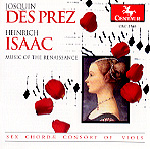Voice and viols can be the most compatible of musical collaborators–the timbres and range of expression complement each other, contrasting and enhancing the individual qualities of each while remaining comfortably close together in the “color” spectrum. Of course, this arrangement works best with certain kinds of voices, not so well with others. Here we find a mixed bag that includes both very well-matched and slightly less-agreeable combinations of voice and instruments. The music itself, primarily drawn from multi-part vocal works of Josquin, Isaac, Senfl, and Obrecht, is variously performed by one or two singers with viols taking the remaining lines. This approach works well both for the reasons stated above and because the performers are well-attuned to the meaning of the texts and seem to really enjoy the expressive possibilities of each song.
Soprano Susan Rode Morris and tenor Scott Whitaker sound good together, especially when Morris’ darker lower-register timbre is set against Whitaker’s brighter tones. And Morris (with her very able viol partners) delivers a wonderfully moving rendition of Isaac’s song “Innsbruck, ich muss dich lassen”–has a lovelier tune ever been written? (Perhaps, but during the four and a half minutes of this rendition, you won’t think so!) Similarly, Morris and Whitaker’s performance of Josquin’s “Regretz sans fin” is appropriately heartfelt and nicely shaped and phrased. Whitaker’s lively performance of Senfl’s brief (58 seconds) nonsense song “Ich weiß nit, was er ihr verhieß” is a charmer, and the couple of viols-only pieces make fine interludes between the vocal works.
Unfortunately, Morris seems to believe that she must alter her quality from song to song, perhaps to better reflect the text (?); but occasionally, as in Josquin’s Ave Maria, her penetrating tone is needlessly obtrusive and even irritating. Different songs find her voice warm and clear, dark and covered, or bright and piercing. Some voices lend themselves to these kinds of interpretive alteration, but when Morris tries it, her tone often sounds off-center and unsteady rather than well-focused and confident. She would make a better impression if she just trusted her natural quality and didn’t try so hard. Overall, however, this is a program well worth hearing for early music fans and for anyone who wants to enjoy some of the more engaging and beautiful repertoire from the late-15th/early-16th centuries. The solo voices are a bit too close and the general sound slightly too bright for my highest sonic recommendation–but this perspective seems to be typical of many Centaur releases, an intended design that’s neither right nor wrong but whose acceptability will vary from ear to ear.
































